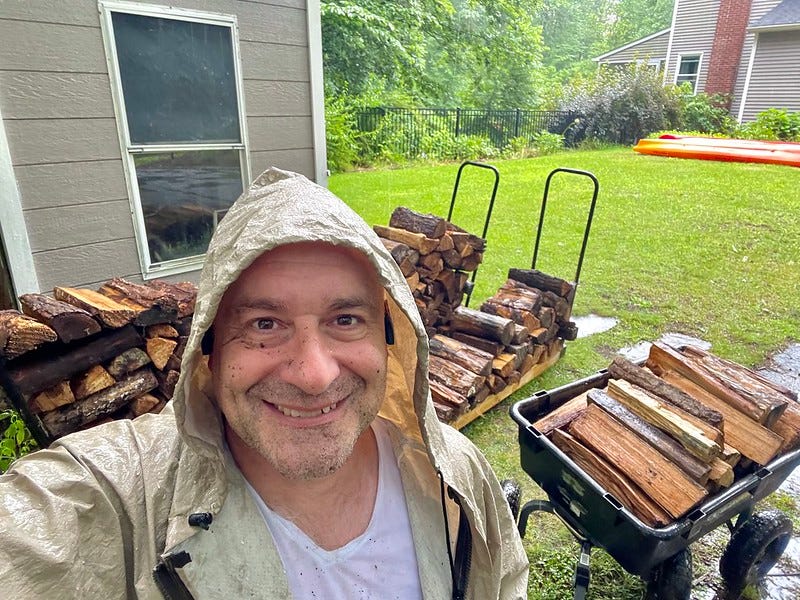Greetings from the Last Homely House! I’ve just stepped out of my car after my longest trip to visit an intern this year - I drove up to Berlin, NH (said, BUR-lin, not Ber-LIN as in the German city it was named after), which is about 2.5 hours each way. It’s usually one of my favorite trips of the year, because I usually strap my kayak on to the Adventure Van, and when I am done, I keep heading north to Errol, NH where the Mollidgewock State Campground is located on a bend in the beautiful Androscoggin River. Unfortunately, as of this week, the lovely wife has taken an office job after more than 20 years of WFH, and someone had to take care of our elderly dog. So it was up and back - no play for me.
Last week I talked metaphorically about oak trees and cutting them down, but this week I am going to talk about it literally. As in, we had two gorgeous, fifty-foot tall oak trees that overhung our driveway here at the LHH, and, although they were beautiful, in the fall they would drop acorns all over the driveway, as well as the occasional branch. Unfortunately the only place I had to park the Adventure Van is directly under said oak trees. So the Adventure Van’s roof looks like it when through a massive hail storm, with pock marks all over. The trees also tossed a branch through the window of my daughter’s little car, damaging the hood in the process, which cost us a pretty nice sum despite insurance, and so the trees sealed their fate. We contacted a tree service to take them down - back in May - and the owner told us he would get to us when he had the time. But before he could cut them down, we had to move our wood pile (see pic below) because it was in the area where he would be dropping branches. We kept meaning to get around to doing that, but the call kept not coming, so we kept delaying. Well, he called this past Sunday, during a torrential downpour, and said he was coming Monday morning, so out I went into the downpour to move about a cord of wood. Yes, that’s mud all over my face.
Top pic is of the stumps of the old trees. Makes me sad to walk past them. But eventually the Adventure Van is going to go up to that big Van Life in the sky, and I’ll need to park a newer vehicle there, and I can’t afford to have it pelted with acorns (or the occasional branch).
On a more fun note, the berries harvest has begun at the LHH! We have about 20 blueberry bushes and a huge patch of raspberries, so we have been harvesting them as quickly as possible. We’ve probably brought in about eight quarts of blueberries so far, and that’s just scratching the surface!
And you know what all berries long to be when they grow up? That’s right - cobbler! It’s hard to make a bad cobbler, but if you are looking for a good recipe, you can do worse than this one.
See you Sunday with another essay. As usual, willing good for all of you!
**
Read
What: Pew Research Center, Young adults in the U.S. are reaching key life milestones later than in the past
Why: This is less shocking than the headline sounds:
Young adults in the United States are reaching key life milestones later than they did 40 years ago, according to a new Pew Research Center analysis of Census Bureau data.
Adults who are 21 are less likely than their predecessors four decades ago to have reached five frequently cited milestones of adulthood: having a full-time job, being financially independent, living on their own, getting married and having a child. By the time they are 25, however, today’s young adults are somewhat closer to their predecessors in 1980 on two of these milestones: having a full-time job and financial independence.
I’ve spent a fair amount of time working on research around “emerging adulthood”, which had been defined as the period 18-25, but has been extended to 18-29 now by social scientists working in the US. Emerging adulthood is the period during which we break away from our parents and start our own lives. What this study finds is that the process is taking longer. Most researchers I have read think this is not necessarily a bad thing if that extension of semi-dependency is because young people are pursuing more education, and spending more time exploring opportunities and careers, before moving out, getting married, and having children.
Gen X and subsequent generations got married later and as a result had fewer divorces. Children in developed countries are a luxury good, not an economic benefit, so people have fewer of them, and have them later. This is consistent with the closing comment of the article:
About 88% of U.S. parents with children younger than 18 say it’s extremely or very important to them that their children grow up to be financially independent and have jobs they enjoy – far higher than the shares who prioritize their children eventually getting married or having children of their own.
Today, more jobs also require longer periods of schooling. The fact that fewer 21-year olds are not financially independent represents at least in part more people pursuing secondary education.
Where these statistics are bad is in communities where people are not using this extended period to develop their ability to participate in the labor force and find good mates. To tease out the significance, we’d need to get more micro with the data. Here’s a partial example of what I mean - the red line is the percent of people 25 years or older, with a college degree who are in the labor force (meaning they are working, or looking for a job but currently unemployed), the blue is people the same age, but without a degree. To be out of the labor force means you are either institutionalized (in the military, in jail, in a mental hospital - I find that mix humorous having spent 23 years in the military), or you are unemployed and not looking for a job (a prosocial example is stay at home mom/dad; a non-prosocial example is someone living in the parent’s basement, eating Cheetos and watching rage TV - there is evidence that this is basically what most men not in the workforce do - they do not use their downtime in a prosocial fashion).
(click on the image to go to the source page)
So one quick takeaway is, people with a degree have more prospects and therefore go out and find work. People without a degree drop out because the relative cost of living in one’s parent’s basement is lower.
So I’m ok with a longer period of emerging adulthood if the time is well-spent.
**
What: City Journal, Rebuilding the Constitutional Structure
https://www.city-journal.org/article/rebuilding-the-constitutional-structure
Why: The Supreme Court had quite a term, with some really far-reaching decisions. I am very happy that the Court ruled against the student loan debt relief program, not just because I thought it created massive issues of moral hazard, but because I genuinely do not believe the President and the executive branch have the authority to unilaterally create such a policy based on my reading of the Constitution. The executive branch agencies generally have wide latitude in interpreting and implementing laws passed by Congress, but this one went well beyond interpretation.
In finding the secretary’s interpretation of that limiting language too much of a stretch, the Court recognized that executive-branch officials can only enforce duly enacted congressional legislation rather than taking action that goes beyond those parameters to make new law.
The Supreme Court didn’t say that the Federal Government can’t provide student debt relief. It just said that if it is going to be done, Congress has to pass a law enacting the policy because the President doesn’t have the authority. So if you are really upset about this, and think it was a good idea to pay off student debt, you should contact your Congressional representatives.
I don’t think this was a good policy. I know many people have taken on too much student debt, and if it is federally guaranteed, they can’t get bankruptcy relief on it, and that’s bad. It runs counter to our social goal of allowing bankruptcy. People shouldn’t have their whole lives ruined because they made a bad financial decision. The first step should be to eliminate federal guarantees for all future borrowers that prevent the borrower from declaring bankruptcy. This would prevent anyone else from getting into the student debt trap. Providing blanket relief for people who borrowed too much is unfair to all the people who have paid off their debts, or never took any out to begin with. Debt relief would be a transfer from non-borrowers and people who paid off their debts to borrowers who are having difficulty.
**
What: Henry V, 4.3, Perspective on a “speed limit” birthday
https://henryv43.com/2023/06/29/perspective-on-a-speed-limit-birthday/
Why: The author, Dr. Chuck Callahan, is a retired Army pediatrician. I had the chance to participate in a book club with him back in the early ‘00’s. He was and continues to be a philosophical leader.
In this post, he runs through “speed limit birthdays” - 15, 25, 25, 45, etc., and what he learned from each of them. It’s a fun list of bulletized points. Worth 5 minutes.
**
Watch
What: William Spaniel, Broken Bridge: How Ukraine's Attack Will Change the Counteroffensive (11 min)
Why: I think Spaniel is going to be a new source for my intelligence on what is going on in Ukraine. Ukraine has used naval drones to attack the bridge that connects Crimea to Russia. Combat is changing quickly. Very interesting. Other comments, including connecting this event to the Black sea Grain Initiative, which the Russians were going to back out of. Much of the Middle East is reliant on Ukrainian grain, and without the Black Sea Grain Initiative, there is going to be a shortage of grain in that area. Everything is connected.
**
Listen
What: EconTalk, Vinay Prasad on Pharmaceuticals, the FDA, and the Death of Duty (69 min)
Why: This is is a wide-ranging discussion with oncologist and epidemiologist, Dr. Vanay Prasad. They discuss drug development and how the system created by the US government and overseen by the FDA encourages marginal advances at very great financial cost, and other topics, but at about the 50 minute mark they get into a discussion about obligation and duty, which is in line with what I have been talking about in the BITW newsletter. He compares the failure of police to intervene in the massacre of children in Uvalde to doctors and nurses refusing to care for COVID patients during the pandemic. Worth a listen. If you take on the role and its benefits, you own the obligation.
**
What: HBR IdeaCast, Escape Your Comfort Zone (23 min)
Why: Fun pod discussing how to get outside your comfort zone and why that is important.
**
What: The Great Antidote, Dan Klein on Hayek and The Band Man (66 min)
Why: Klein was my dissertation chair, and I learned a ton from him, so I never pass up a chance to listen to him speak. In this pod, he talks about our evolutionary background as members of a band (small, familial group). We weren’t evolved to live alone or even in atomic families (mom, dad, 1.8 kids), we were evolved to live in familial groups of about 50. We’re literally hardwired for it. And so that hardwiring makes us value all sorts of things that don’t work well in a modern, capitalist society where we do, in fact, live in atomic families. Well worth a listen.








